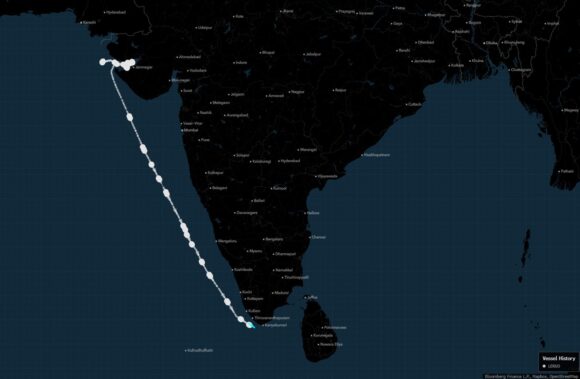One month after being hit by European Union sanctions, India’s Nayara Energy Ltd. is relying on a growing pool of dark-fleet tankers to transport its products, and a narrowing menu of crude imports to keep its operations running.
The oil refiner’s struggle for survival has come to the attention of India’s government, which is concerned about disruptions to oil flows that could jeopardize national energy security, according to people familiar with the matter. New Delhi has approved at least one coastal tanker in recent days to help the company move cargoes domestically, they said.
The refiner, part-owned by Russian oil major Rosneft PJSC, is an important pillar of the Indian market. Its 400,000 barrels-a-day processing plant accounts for 8% of the country’s refining, and the company operates 7% of its fuel stations. It’s been forced to reduce run rates after being spurned by trade partners following the EU’s measures targeting Moscow’s oil revenues.
Some of the tankers already greenlit by the government to supply Nayara with oil, and transport its refined products, include sanctioned vessels. One such dark-fleet ship, the Leruo, has made at least three domestic runs for Nayara after getting the go-ahead from New Delhi, according to a shipowner, who declined to be named discussing sensitive information, and ship-tracking data.

The medium-range tanker was blacklisted by the EU on July 18, part of a broad sanctions package targeting Russian oil exports that also penalized Nayara. Leruo’s owner is listed as Key Marvel Ltd. on S&P Global Inc.’s maritime database, although no contact details were included.
Long-range tanker Next, another EU-sanctioned vessel that’s also blacklisted by the UK, is due to arrive at Nayara’s Vadinar terminal on Wednesday to pick up a cargo of diesel, according to a port agent’s report and ship-tracking data. The database lists Istanbul-based Next Maritime & Trading Ltd. as its owner, again with no email or phone number.
Such vessels are filling the gap left by local shipowners that have stopped doing business with Nayara. They’ve been forced to cut ties to protect their dealings with European ports and insurers. Ships that are covered by Russian or Iranian insurance — and which have been approved by New Delhi — are eligible to service Nayara.
Nayara has more than 1.2 million barrels of refined products on four sanctioned vessels idling off Vadinar, according to shipping data.

